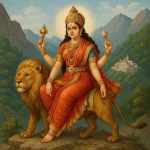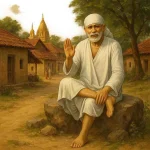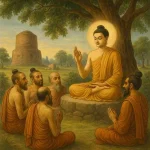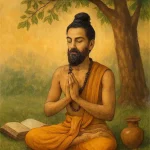Lessons of Karbala (10th Muharram) : Views of Faith Scholars

The event of Karbala marks the greatest sacrifice for the sake of God in the human history. The minute and stunning details of this great event have been written and survived from the very first day by the eye witnesses. For the last fourteen hundred centuries, the battle of Karbala reflects the collision of the good versus the evil, the virtuous versus the wicked, right versus the wrong, and the collision of Imam Husain (the head of virtue) versus Yazid (the head of impiety).Before the battle of Karbala, the world knew only the rule that “The Might is the Right”. However, the day of Ashura introduced even more powerful ruleto this world; “The Right is the Might”. Now, the blood of the innocent could win over the sword of tyrant.
Mahatma Gandhi writes: “I learned from Husain how to achieve victory while being oppressed.”
According to the great poet Rabindranath Tagore, Husain’s sacrifice indicates spiritual liberation. He writes: “In order to keep alive justice and truth, instead of an army or weapons, success can be achievedby sacrificing lives, exactly what Imam Husain (A.S.) did” Such an everlasting victory can only be achieved by the one who totally believes and trust in the Almighty God.
Antoine Bara writes: “No battle in the modern and past history of mankind has earned more sympathy and admiration as well as provided more lessons than the martyrdom of Husain in the battle of Karbala.”
History has seen numerous massacres of innocent people, but the tragedy of Karbala is one of the few where men, women and children voluntarily allowed themselves to be subjected to hunger, thirst, humiliation and death on the burning sands of Karbala because they believed that Imam Husain (A) stood of righteousness. Little wonder that for over 1400 years Muslims, have been nurturing the tale of Karbala in their hearts like an open wound, lest they should forget the supreme sacrifice of Imam Husain (A.S) and his followers.Great spiritual leaders are known to make great sacrifices, but at Karbala, common men and women with infants at their bosom, their hearts and souls aflame with righteousness, chose death rather than evil and weakness. Such was the greatness of Imam Husain (A): such was his spiritual power, which could uplift common mortals to heights of supreme courage and sacrifice.The tragedy of Karbala took place in 680 AD on the banks of the Euphrates in Iraq, but Karbala has a universal appeal and in today’s climate of violence, it is more relevant than ever. The tragedy of Karbala and its spirit of non-violent resistance and supreme sacrifice has been a source of inspiration to the likes of Mahatma Gandhi and Pandit Nehru. Mahatma Gandhi’s first Salt Satyagrah was inspired by Imam Husain’s non-violent resistance to the tyranny of Yazid. Gandhi is said to have studied the history of Islam and Imam Husain (A), and was of the opinion that Islam represented not the legacy of a sword but of sacrifices of saints like Imam Husain (A.S).
Mahatma Gandhi writes: “My faith is that the progress of Islam does not depend on the use of sword by its believers, but the result of the supreme sacrifice of Husain (A), the great saint.”
Nehru considered Karbala to represent humanities strength and determination. He writes:“Imam Husain’s (A) Sacrifice is for all groups and communities, an example of the path of righteousness.”
Dr. Radha Krishna writes, “Though Imam Husain (a) gave his life almost 1300 years ago, but his indestructible soul rules the hearts of people even today.”
Swami Shankaracharya describes, “It is Husain’s (A.S) Sacrifice that has kept Islam alive or else in this world there would be no one left to take Islam’s name.”
Edward Gibbon (1737-1794), considered as the greatest British historian of his time writes, “In a distant age and climate the tragic scene of the death of Husain will awaken the sympathy of the coldest reader.”
On the sight of such sacrifice and altruism, many intellects and philosophers around the world were touched by the greatness of this man, understood the core of his mission, and grasped the essence of the school of Karbala. Karbala symbolizes the true face of struggle against injustice – non-violent resistance. Not taking life but sacrificing your life for Islam.72 of Imam’s kinsmen accompanied him, and all were slain in the land of Karbala to achieve righteousness. He not only gave himself up but everything possible in the way of God, including his few months old baby Ali Al Asghar, and with unyielding steadfastness.Young and old, women, men, children and infants…inseparable despite the hunger, thirst, heat, torture, and death they were subject to..Still unyielding, and their hearts and souls with righteousness chose death rather than evil and weakness. Such are the principles that feed and nurture the hearts of the Muslims who over the past 1400 years have been reviving the epic of Karbala.There is a saying that “Every Land is Karbala, and every day is Ashura”, yes indeed. Husain fought for justice, freedom, truth and enlivening human merits. But these are the same concepts we live today, those that our ancestors lived earlier, and those that generations to come will live tomorrow, because these concepts never become obsolete, never!
More on the sacrifice of Imam Husain, Dr. Rajendra Prasad writes, “The sacrifice of Imam Husain (A) is not limited to one country, or nation, but it is the hereditary state of the brotherhood of all mankind.”
Sarojini Naidu, a great poet writes, “I congratulate Muslims that from among them, Husain (A), a great human being was born, who is revered and honored totally by all communities”
Lessons provided by Imam Husain are lessons for today, as the world lives hegemonic and colonial schemes, witnesses thousands and thousands of innocents die over wars of greed while only a few fight for virtue. Karbala symbolizes the true face of struggle against injustice – non-violent resistance. Not taking life but sacrificing your life for Islam.









